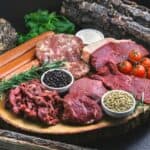The Pros and Cons of Dairy on the Keto Diet
The ketogenic (keto) diet has gained immense popularity in recent years, primarily for its potential weight loss and health benefits. One of the most debated topics within the keto community is the role of dairy products in this low-carb, high-fat diet. In this article, we will explore the pros and cons of including dairy in your keto diet, addressing common questions and concerns, and providing specific answers and solutions to help you make informed decisions.
What is the Keto Diet?
The keto diet is a low-carbohydrate, high-fat, and moderate-protein diet that aims to shift the body’s metabolism from burning glucose (sugar) to burning ketones (fat) for energy. This metabolic state, known as ketosis, can lead to weight loss, improved mental clarity, and increased energy levels. The standard keto diet typically consists of 70-80% fat, 20-25% protein, and 5-10% carbohydrates.
The Role of Dairy in the Keto Diet
Dairy products, such as milk, cheese, yogurt, and butter, are often included in the keto diet due to their high-fat content and relatively low carbohydrate content. However, not all dairy products are created equal, and some may be more suitable for the keto diet than others. Let’s dive into the pros and cons of including dairy in your keto diet.
Pros of Including Dairy in the Keto Diet
1.
High in Healthy Fats
Dairy products, especially full-fat versions, are rich in healthy fats like saturated and monounsaturated fats. These fats can help you reach your daily fat intake goals on the keto diet, making it easier to maintain ketosis and reap the benefits of this metabolic state.
2.
Rich in Nutrients
Dairy products are packed with essential nutrients, such as calcium, phosphorus, potassium, and vitamins A, D, and B12. Including dairy in your keto diet can help ensure you’re getting these vital nutrients, which are crucial for maintaining strong bones, a healthy immune system, and proper nerve function.
3.
Protein Source
Dairy products are also a good source of high-quality protein, which is essential for building and repairing tissues, producing hormones and enzymes, and supporting a healthy immune system. Including dairy in your keto diet can help you meet your daily protein needs without significantly increasing your carbohydrate intake.
4.
Versatility and Taste
Dairy products can add variety and flavor to your keto meals, making it easier to stick to the diet long-term. From using heavy cream in your morning coffee to enjoying a slice of cheese with your favorite keto-friendly crackers, dairy can make the keto diet more enjoyable and sustainable.
Cons of Including Dairy in the Keto Diet
1.
Lactose Intolerance and Sensitivity
Lactose intolerance is a common digestive issue where the body is unable to fully digest lactose, the sugar found in milk and dairy products. Consuming dairy can cause digestive symptoms like bloating, gas, and diarrhea in individuals with lactose intolerance. Additionally, some people may have a sensitivity to dairy proteins, such as casein and whey, which can cause inflammation and digestive issues.
2.
Carbohydrate Content
While many dairy products are low in carbohydrates, some can still contain enough carbs to potentially interfere with ketosis. For example, a cup of whole milk contains about 12 grams of carbohydrates, which can quickly add up if you’re aiming for a daily carb intake of 20-50 grams. It’s essential to carefully monitor your dairy consumption and choose low-carb options to maintain ketosis.
3.
Calorie-Dense
Dairy products can be calorie-dense, which may lead to weight gain or stall weight loss if consumed in excess. It’s crucial to be mindful of portion sizes and track your calorie intake to ensure you’re not overeating, even on a keto diet.
4.
Hormones and Antibiotics
Some dairy products may contain hormones and antibiotics, which can have negative health effects. To minimize exposure to these substances, opt for organic and hormone-free dairy products whenever possible.
How to Include Dairy in Your Keto Diet Wisely
If you decide to include dairy in your keto diet, follow these tips to do so wisely:
1. Choose full-fat, low-carb dairy options, such as heavy cream, butter, and hard cheeses like cheddar or parmesan.
2. Opt for organic, grass-fed, and hormone-free dairy products to minimize exposure to hormones and antibiotics.
3. Be mindful of portion sizes and track your carbohydrate and calorie intake to ensure you’re staying within your daily goals.
4. If you’re lactose intolerant or sensitive to dairy proteins, consider using lactose-free or dairy-free alternatives, such as almond milk, coconut milk, or dairy-free cheese.
Conclusion
In summary, dairy can be a valuable addition to the keto diet for many individuals due to its high-fat content, nutrient density, and versatility. However, it’s essential to be mindful of potential drawbacks, such as lactose intolerance, carbohydrate content, and calorie density. By carefully selecting dairy products and monitoring your intake, you can enjoy the benefits of dairy while maintaining ketosis and achieving your health goals.



